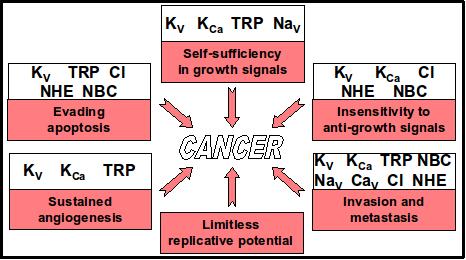With over 3 million new cases and 1.5 million arising deaths each year in Europe, cancer is a major public health problem with an urgent need for new therapies. The IonTraC project builds upon mounting evidence that ion channels, transporters and associated proteins (the "transportome") are expressed aberrantly in cancer and underlie many of the hallmarks of cancer as defined by Hanahan and Weinberg (fig. 1).

Fig. 1: Contribution of ion transport proteins to cancer. KV, KCa: voltage-gated/Ca2+ sensitive K+ channels; Cl: Cl- channels; NaV, CaV: voltage-gated Na+, Ca2+ channels; TRP: transient receptor potential channels: NHE: Na+/H+ exchange; NBC: Na+-HCO3- cotransport; adapted from Fraser & Pardo, 2008.
Proving their therapeutic potential, treatments targeting Cl- channels and carbonic anhydrase IX have successfully entered phase II clinical trials in brain and kidney cancer. Thus, proteins involved in membrane transport, long known as important drug targets in other diseases (e.g. hypertension), are a new class of therapeutic and/or diagnostic targets in oncology.
Pancreatic ductal adenocarcinoma (PDAC) has one of the worst prognoses of all cancers, with an overall 5-year survival rate of less than 5%. As PDAC is a disease of the elderly and given the European population is aging, the incidence is very likely to increase. Work carried out by our, partner and other laboratories, and exploration of published gene arrays yield a strong expectation that ion transport proteins play a crucial role in PDAC progression.